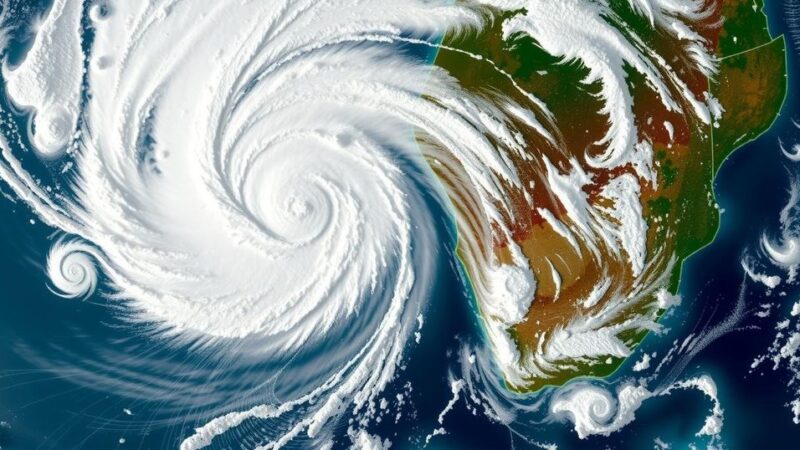Hurricane Helene has resulted in at least 155 deaths in the southeastern United States, prompting urgent rescue efforts. President Biden and Vice President Harris are visiting affected states to survey damage. North Carolina has the highest fatalities, and power outages persist for over 1.4 million households. The storm’s connection to climate change has further fueled political discourse regarding disaster response.
Hurricane Helene has resulted in a devastating toll of over 155 confirmed fatalities across the southeastern United States, with rescue operations ongoing. As rescue workers deployed helicopters to reach isolated regions affected by the storm, Democratic presidential candidate Kamala Harris is set to visit Georgia on Wednesday to assess the devastation. Both President Joe Biden and Vice President Harris’s trips are seen as crucial in the aftermath of the disaster, particularly in battleground states that are pivotal in the upcoming presidential election. The fatalities from the hurricane include 74 deaths in North Carolina, 36 in South Carolina, 25 in Georgia, 14 in Florida, four in Tennessee, and two in Virginia. Emergency personnel are working tirelessly to restore power and water services, with approximately 1.4 million households still without electricity. The storm, initially a Category Four hurricane with winds reaching 140 miles per hour, has affected a wide stretch of more than 500 miles, leading to significant infrastructural damage and loss of life. Buncombe County in North Carolina, known for the tourist destination Asheville, has suffered the highest number of fatalities. North Carolina Governor Roy Cooper expressed concern that the death toll may rise as recovery efforts continue. Amidst the chaos, recovery efforts face numerous challenges, including blocked highways and ongoing power outages. The political ramifications of the storm have been pointed out, with contrasting statements between the Biden and Trump campaigns regarding their responses to the crisis. Scientists are increasingly correlating such severe storms with climate change, prompting discussions about the implications of global warming in this context. In response to questions regarding the influence of climate change on the hurricane’s severity, President Biden affirmed, “Absolutely, positively, unequivocally, yes, yes, yes, yes.”
Hurricane Helene made landfall as a formidable Category Four hurricane, impacting several southeastern states in the United States. With winds of 140 miles per hour, it caused extensive damage and loss of life as it moved inland. The response from local, state, and federal government officials highlights the urgency of addressing the effects of natural disasters in light of climate change, which is being increasingly linked to the intensity of hurricanes. This storm has also become intertwined in the current political landscape leading up to the presidential elections, showcasing the interplay between environmental disaster response and political strategy.
The aftermath of Hurricane Helene illustrates the severe impact of natural disasters on communities, with the death toll exceeding 155 and many still unaccounted for. Rescue operations continue as both political leaders assess the damage in crucial battleground states ahead of the elections. The ongoing challenges faced by emergency workers underscore the necessity for adequate disaster response and the growing recognition of climate change’s role in intensifying such events. The statements made by political leaders highlight the differing perspectives on disaster response and climate change implications in the current political climate.
Original Source: www.france24.com







